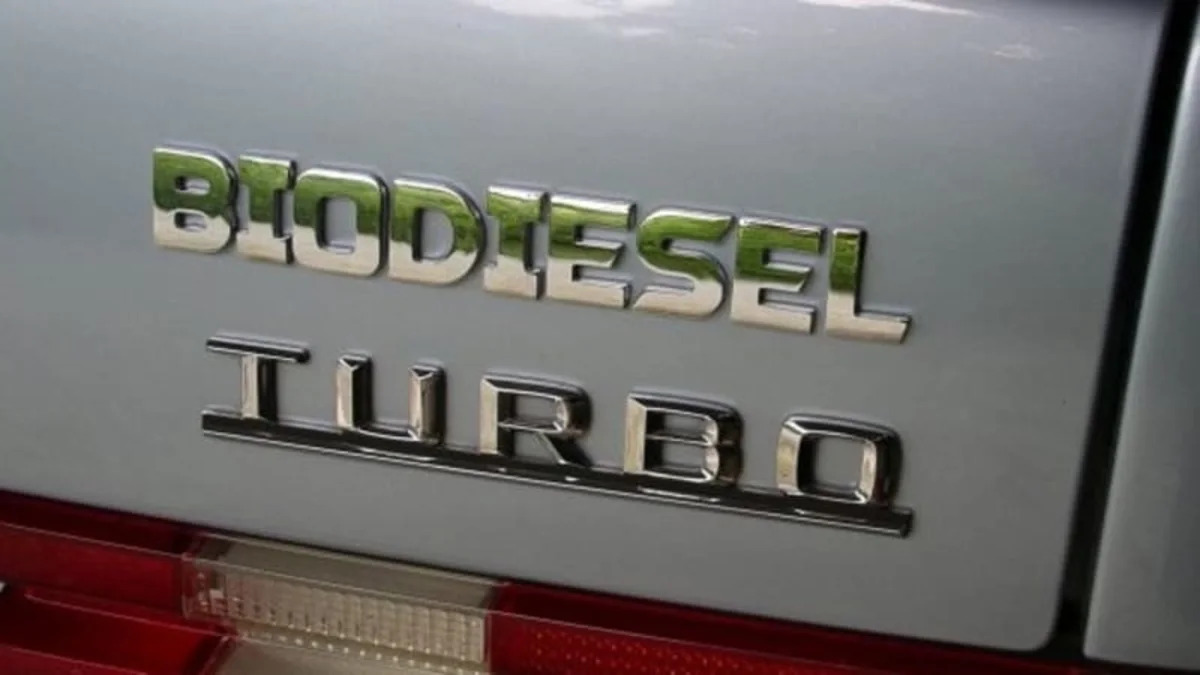What is biodiesel? In short, biodiesel is a fuel that's suitable for use in diesel engines that is not based on petroleum. Biodiesel is often made from plant sources. It's also possible to mix biodiesel with petroleum-based diesel fuel in any ratio. Since most any engine designed to run on diesel fuel can use biodiesel, it would seem that this biofuel could displace a great deal of fuel pumped from the ground. In some cases, it is possible to run diesel engines on straight vegetable oil (often referred to as SVO or WVO), but SVO isn't the same as biodiesel. There is  a bunch of complex chemistry that goes into producing biodiesel from many different sources, and it all has to do with the transesterification of fats and oils. Excuse me? Transester-huh? Yeah, it's about as complicated as it sounds, but the really short version of the story is that alcohol (methanol, ethanol etc.) is used to modify the chemical makeup of the original oil.
a bunch of complex chemistry that goes into producing biodiesel from many different sources, and it all has to do with the transesterification of fats and oils. Excuse me? Transester-huh? Yeah, it's about as complicated as it sounds, but the really short version of the story is that alcohol (methanol, ethanol etc.) is used to modify the chemical makeup of the original oil.
Now that we've identified what biodiesel is and isn't, let's discuss why you should care and whether you can use it in your own vehicle. Read on.
 a bunch of complex chemistry that goes into producing biodiesel from many different sources, and it all has to do with the transesterification of fats and oils. Excuse me? Transester-huh? Yeah, it's about as complicated as it sounds, but the really short version of the story is that alcohol (methanol, ethanol etc.) is used to modify the chemical makeup of the original oil.
a bunch of complex chemistry that goes into producing biodiesel from many different sources, and it all has to do with the transesterification of fats and oils. Excuse me? Transester-huh? Yeah, it's about as complicated as it sounds, but the really short version of the story is that alcohol (methanol, ethanol etc.) is used to modify the chemical makeup of the original oil.
Now that we've identified what biodiesel is and isn't, let's discuss why you should care and whether you can use it in your own vehicle. Read on.
Why use biodiesel? We often hear of the desire to reduce the United State's dependence on foreign oil. Biodiesel is one way to do that, and in fact the use of biodiesel in lieu of petroleum-based diesel fuel can reduce any country's fossil fuel intake. A reduction in greenhouse gas emissions is also an oft-cited benefit to biodiesel use. Burning biodiesel does release carbon into the atmosphere, but the plants often used to create the fuel also sucked up carbon dioxide as they grew. Depending on the feedstock used to create the biodiesel, a huge reduction in greenhouse gases could be realized over petroleum-based diesel fuel. Biodiesel can also reduce the emissions of particulate matter, benzofluoranthene and benzopyrenes and can be created from waste products that may otherwise be unused.
Plus, Willie Nelson and Daryl Hannah are big fans... which is nice.
Is there any reason not to use biodiesel? There are concerns, some more serious than others, regarding the use of food crops for fuel and in deforestation in countries that clear trees to plant crops for biodiesel. In other words, it's best to know where your biodiesel is coming from and what crops were used to create it. What's more, some biodiesel fuels begin to gel at higher temperatures than their petroleum-based competitors. For this reason, organizations like ASTM International have created a set of standards for biodiesel makers to adhere to. Since these specifications exist, it's probably best to stick with fuels that carry a specific certification unless you're confident that the fuel you put in your tank is not going to cause problems. There are also organizations that are working to ensure that biodiesel production is sustainable.
Can I use it in my car? That's an excellent question, and one that is currently being worked out. Most manufacturers allow the use of B5, or biodiesel in concentrations of up to 5 percent in their current vehicles with no questions as to whether it voids the warranty. Older vehicles, especially older models from Mercedes-Benz and Volkswagen, that are already out of warranty anyway have proven popular - and reliable - choices for higher biodiesel concentrations. On the other hand, biodiesel can degrade certain types of rubber that were common on these older vehicles, so it might be a good idea to consult a professional for advice on what work might need to be done to any car that's going to become a bit of a fuel herbivore.
Where do we go from here? Again, that's complicated. Whether or not biodiesel use picks up may have much to do with the sales of diesel-powered vehicles around the world. Many governments around the world, including here in the United States, have created legislation promoting the use of biofuels, including biodiesel. Research into such diverse next-generation biodiesel feedstocks as algae, hemp and animal fats will surely continue as the years go on.
For complete coverage of biodiesel news on AutoblogGreen, click here.





Sign in to post
Please sign in to leave a comment.
Continue